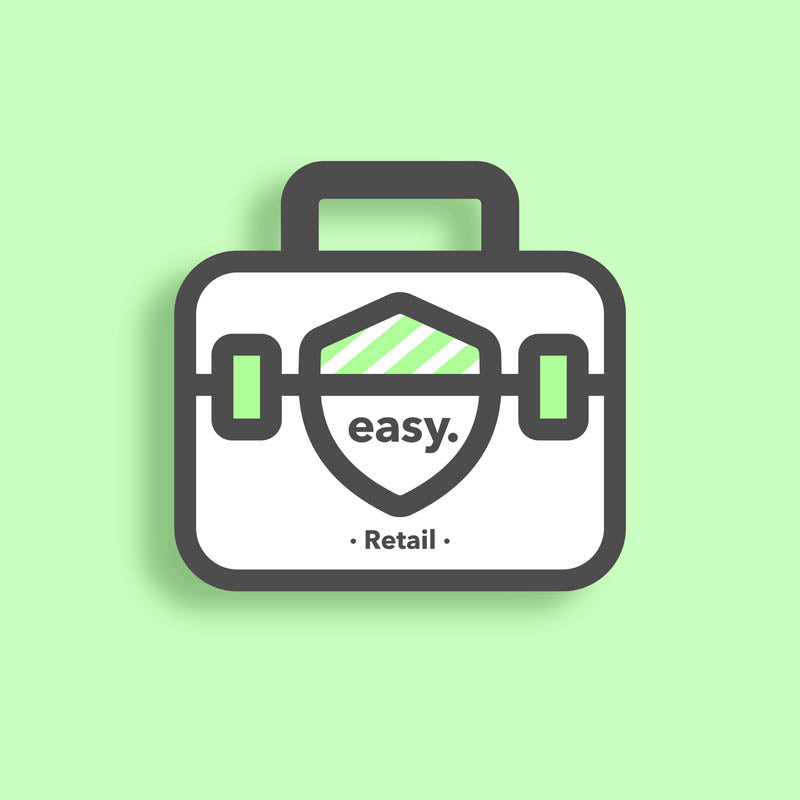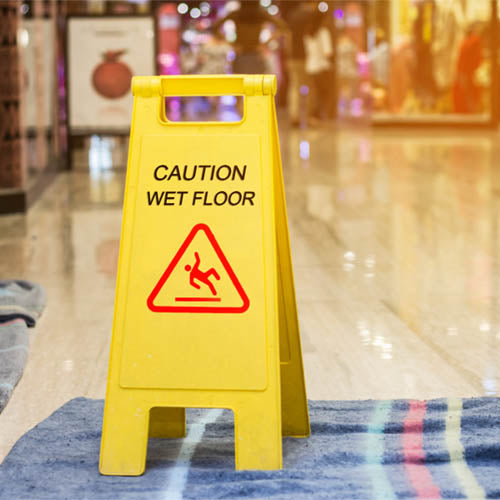
Retailer Health & Safety Documents

Master health & safety in your retail space with our essential tools.
Quickly elevate health & safety standards in your retail store, retail space or pop-up shop by managing health & safety yourself. Our retail health & safety documents, templates, and guidance are designed to be straightforward and user-friendly. Many are pre-populated with relevant information and pre-filled examples are included to make filling in your documents much easier.

Beyond the Sales Floor: Health & Safety Priorities for Retail Success
In the bustling world of retail, success is often measured by sales targets, customer satisfaction, and brand reach. However, beneath the impressive displays and the busy hum of cash registers, lies a critical foundation that supports the entire operation: health & safety. Ensuring a safe shopping and working environment is not just a legal requirement but a vital component of a thriving retail business.
Why Health and Safety Matter for Retailers
Retail environments are unique. Unlike office settings, they are dynamic spaces that constantly change with new promotions, products, and people. This means that the potential for hazards such as slips, trips, and falls, is amplified. Moreover, the well-being of staff operating in such environments is paramount; after all, a happy team is the beating heart of any successful retail brand.
Prioritising Employee Well-being
Investing in the health & safety of retail staff is an investment in the company’s future. Training employees on proper manual handling techniques can dramatically reduce workplace injuries. Additionally, implementing ergonomic solutions, such as lifting aids, can minimise the risks associated with repetitive tasks and prolonged standing, leading to increased productivity and morale.
Crafting a Safe Customer Experience
Customers expect a safe shopping experience. Regular risk assessments and clear signage can go a long way in preventing accidents. Moreover, having robust procedures for emergency situations, such as fires or medical emergencies, not only ensures customer safety but also builds trust in the brand.
Building a Culture of Safety
Health & safety should be ingrained in the company culture, not just seen as a compliance obligation. Regular staff training, open communication channels, and a non-punitive approach to reporting near-misses can foster a culture where safety is everyone's responsibility.
In Summary...
In retail, success on the sales floor is only part of the picture. Behind the scenes, health & safety is the unsung hero. By giving it priority, retailers can ensure the longevity of their business, the well-being of their staff, and the loyalty of their customers. When health & safety become part of a brand’s identity, they not only prevent negative outcomes but also contribute positively to the company’s reputation and bottom line. Let's remember, a successful retail space is a safe retail space.
-

Manual Handling and Ergonomics
Retail workers often engage in lifting, carrying, and moving stock, activities that, without proper training or correct manual handling techniques, can lead to a significant risk of musculoskeletal injuries. The prevalence of repetitive tasks, prolonged periods of standing, and poor workstation ergonomics can further contribute to the occurrence of strains and overexertion injuries.
-

Slips, Trips, and Falls
These are the most common accidents in retail settings, often resulting from hazards such as wet floors, uneven floor surfaces, obstructions in aisles, or improper footwear. Inadequate responses to spillages and insufficient lighting that leads to reduced visibility are also significant contributing factors. To mitigate these risks, it's essential that regular maintenance checks are performed, and staff are trained to prevent such incidents.
-

Violence and Abuse
Staff in retail environments can face aggressive behaviour from customers and, in some unfortunate cases, may be subjected to robberies and related threats. This is not only a physical risk but can also have psychological impacts often manifesting as increased stress levels, heightened anxiety, or even long-term emotional trauma that can affect personal well-being and job performance.

Why pay expensive consultant fees when you can manage H&S yourself?
Improve your compliance while saving time and money by creating health & safety documents, customised to your business, yourself. Our retailer health & safety range covers a suite of essential documents including health & safety policies, risk assessments, COSHH forms, fire safety documents, health & safety guidance, safety posters and more.
Benefits of managing H&S yourself...
-

Improve safety
Health & safety at work is about preventing accidents, incidents and ill-health by assessing the work environment, the activities within it, and taking appropriate action.
-

Increase compliance
Our ready to use documents, many of which are prefilled, will enable you to quickly increase your compliance to UK health & safety law.
-

Save money
With UK H&S consultants often charging upwards of £400 per day, there is a better way. Take control and save yourself time and money.

Health & Safety Simplified: Tailored Strategies for UK Retailers
As a retail store owner or manager in the UK, satisfying health and safety compliance within tight budgets and schedules is no mean feat. The retail world moves quickly, and there’s little time or spare cash to navigate the maze of health and safety rules. But getting this right is key—not just for staying on the right side of the law but for looking after your team and customers, which is good for business in the long run.
We offer straightforward, affordable ways to meet your health and safety needs, specifically tailored for the unique spaces of UK shops, from small high street boutiques to larger retail spaces. By zeroing in on what's important and using our smart, yet simple-to-use resources, you can quickly raise your health and safety game.
This isn't just about ticking boxes; it's about making your store a safer place to shop and work, boosting trust, and building a reputation for caring as much about people as you do about profits
Frequently Asked Questions
Retailer Health & Safety: FAQs
What are the minimum health and safety requirements for a small retail shop in the UK?
Health & safety laws apply to all businesses. As an employer, or a self-employed person, you are responsible for health & safety in your workplace. The approach you take should be proportionate to the size of your business and the nature of the business activity. For most small, low-risk businesses the steps you need to take are straightforward, all that is required is a series of practical tasks, visit this link for more information.
Quickly increase your Retail business's health & safety compliance across the board with our Health & Safety Bundles. These provide a suite of essential documents that make the whole process easy.
Find our Retailer Health & Safety Bundle here.
How often should risk assessments be carried out in retail environments?
Risk assessments should be treated as a living document that is continuously updated. It is recommended to formally review them at least once a year or more often if there are any significant changes to the retail space, introduction of new equipment, or new work practices. Also, if an incident occurs that suggests your current assessment might be inadequate, it should be reviewed and revised accordingly to ensure continued safety for staff and customers.
Find out Retailer Risk Assessment here.
What should be included in a retail store's health and safety policy?
A comprehensive health and safety policy should include a clear statement of intent to manage health and safety effectively, the responsibilities at all levels of the organisation from the management down to the staff, and the practical arrangements in place—everything from risk assessments to the actions taken to reduce or control the risks, through to the training and engagement of staff. It should also detail the process for ongoing monitoring and review to ensure the policy remains effective.
Find our simple-to-use Health & Safety Policy Statement here.
What are the health and safety requirements for pop-up shops?
Pop-up shops must comply with health and safety regulations to ensure a safe environment for customers, staff, and visitors. Key steps include conducting a thorough risk assessment to identify potential hazards such as slips, trips, electrical safety, and fire risks. Implement control measures to address these hazards, such as maintaining clear walkways, using safe electrical setups, and having fire safety equipment in place.
You should also ensure proper signage is displayed, particularly for fire exits, and that all staff are trained on health and safety protocols. Maintaining an accident report form and completing routine safety checks are essential for ongoing compliance.
To simplify this process, consider using a health and safety document bundle tailored for pop-up shops, which includes risk assessment templates, safety policies, and guidance to help meet legal requirements and protect your business.
Are fire drills compulsory in retail stores, and how frequently should they be conducted?
Fire drills play a critical role in ensuring that both staff and customers can quickly and safely evacuate the retail space in the event of a fire. UK law requires that fire drills are conducted regularly—typically once a year for most retail environments. However, if there are significant changes to the premises or staff composition, or if you employ vulnerable people such as those with disabilities, more frequent drills may be necessary. The results should be recorded and used to improve the evacuation strategy as needed.
Find our Fire Safety range here.
How should a retail store manage slips, trips, and falls?
Slips, trips, and falls are some of the most common workplace accidents, and in retail settings, the risks can be higher due to customer footfall and the nature of the work. Managing these risks involves maintaining clean and tidy walkways, promptly dealing with spillages, ensuring adequate lighting, and providing warning signs for potential hazards. It also involves the design and layout of the store, such as the placement of displays and stock so as not to impede customer walkways, and ensuring that flooring is suitable and well maintained.
Find our simple to use Accident Report Form here.
What are the first aid requirements for UK retailers?
The Health and Safety (First-Aid) Regulations 1981 mandate that all employers, including those in the retail sector, provide adequate and appropriate equipment, facilities, and personnel to ensure their employees receive immediate attention if they are injured or taken ill at work. The specifics can vary depending on the size of the store and the risk assessment's findings, but they typically include having a first aid kit, a person appointed to manage first aid (appointed person), and information readily available for all staff regarding first-aid arrangements.
Find our simple to use Accident Report Form here.
What are the reporting requirements for accidents in a retail setting?
As stipulated by RIDDOR, employers in retail must report certain accidents, occupational diseases, and specified dangerous occurrences that happen at work. This includes an accident that results in an employee’s absence from work for more than seven consecutive days (not counting the day of the accident). The report must be made online through the HSE website or by telephone to the Incident Contact Centre. It's critical for retail managers to keep a record of all such incidents in an accident book, which can be scrutinised by enforcing authorities.
Find our simple to use Accident Report Form here.
Can a retail store be fined for non-compliance with health and safety regulations?
Yes, non-compliance can lead to severe repercussions. If health and safety breaches are identified, enforcement notices can be issued by the regulators, such as the HSE or local authorities, requiring businesses to stop certain practices or to make necessary changes. Continued non-compliance can lead to prosecutions and fines, which can be substantial. The HSE can prosecute businesses for serious breaches, which can result in unlimited fines and, in the most serious cases, imprisonment. Therefore, it's crucial to stay informed and diligent regarding health and safety in the retail sector to ensure the well-being of everyone involved and the business's reputation.
Quickly increase your Retail business's health & safety compliance across the board with our Health & Safety Bundles. These provide a suite of essential documents that make the whole process easy.
Find our Retailer Health & Safety Bundle here.







